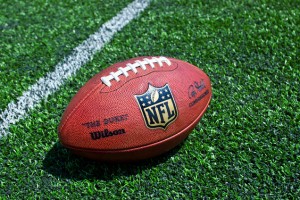NFLPA Continues To Ignore The Awful CBA It Agreed To
Next time, pay attention to what you're signing.
 Ezekiel Elliott was still in high school when the NFL and the players’ union ratified the current collective bargaining agreement in 2011.
Ezekiel Elliott was still in high school when the NFL and the players’ union ratified the current collective bargaining agreement in 2011.
While Elliott was learning how to drive a car, the NFL Players Association was handing Roger Goodell the keys to an unstoppable disciplinary machine without regard for fairness, due process, or sanity.
There is no way to reconcile Elliott’s six game suspension for alleged domestic violence without any criminal charges being filed while kicker Josh Brown got one game — and he admitted abusing his wife. Let’s also not forget that Tom Brady served a four game suspension for maybe knowing that footballs were a little deflated while Ray Rice initially received a two-game suspension and a standing ovation from Ravens fans after knocking his fiancé unconscious in an Atlantic City casino.

Is The Future Of Law Distributed? Lessons From The Tech Adoption Curve
At the risk of sounding like a broken record, this arbitrary disciplinary system is exactly what the NFLPA bargained for when it agreed to Article 46 of the CBA. That section granted Goodell the broad power to discipline players for “conduct detrimental to the integrity of, or public confidence in, the game of professional football.”
When the CBA doomed Brady’s effort to appeal the Deflategate suspension to the Second Circuit, I wrote that “Tom Brady Got Exactly What the NFLPA Bargained For” and when that pesky agreement halted Adrian Peterson’s appeal of a suspension to the Eighth Circuit, I wrote a remix titled “The Shoddy NFL Collective Bargaining Agreement Claims Its Latest Victim: Adrian Peterson.”
Cue version 3.0.
Elliott is currently in the middle of a multi-day appeal of his suspension in front of arbitrator Harold Henderson where he hopes to prove his innocence.
Sponsored

Legal AI: 3 Steps Law Firms Should Take Now

Early Adopters Of Legal AI Gaining Competitive Edge In Marketplace

Navigating Financial Success by Avoiding Common Pitfalls and Maximizing Firm Performance

Early Adopters Of Legal AI Gaining Competitive Edge In Marketplace
The deck is already stacked against Elliott — and the NFLPA should have seen it coming.
First, the CBA provides Goodell with the power to either sit as the arbitrator himself as he did in Deflategate, or unilaterally appoint one. The appointment of Henderson is particularly troubling for Elliott because Henderson is the president of the Player Care Foundation, a League-affiliated charity. He previously served for sixteen years as the League’s vice president for labor relations and chairman of the NFL Management Council Executive Committee. He also sided with the league in upholding Peterson’s suspension, which the Eighth Circuit Court of Appeals later affirmed.
That glaring conflict of interest illustrates why the players needed to pay more attention to the CBA before it was ratified in 2011.
As the Hon. Steven Colloton held while writing for a three-judge panel on the Eighth Circuit Court of Appeals in Peterson’s case:
Allowing the Commissioner or the Commissioner’s designee to hear challenges to the Commissioner’s decisions may present an actual or apparent conflict of interest for the arbitrator. But the parties bargained for this procedure, and the Association consented to it. See CBA art. 46 § 2(a). It was foreseeable that arbitration under the Agreement sometimes would involve challenges to the credibility of testimony from Goodell or other League employees. When parties to a contract elect to resolve disputes through arbitration, a grievant can ask no more impartiality than inheres in the method they have chosen.
Sponsored

The Business Case For AI At Your Law Firm


Is The Future Of Law Distributed? Lessons From The Tech Adoption Curve
Second, nothing in the CBA compels the league to produce witnesses for cross-examination or to turn over key evidence. Prior to the appeals hearing, Henderson denied Elliott’s request to make his accuser available for cross-examination. Since she would not be available live, Elliott asked to examine the league’s notes from its multiple interviews with her. That too failed.
Since we know how the Eighth Circuit would come down on such a one-sided process, how about looking across the country in the Second Circuit? Elliott is toast there too.
While putting Deflategate to bed once and for all last year, the Hon. Barrington D. Parker explained that:
If it is seriously believed that these procedures were deficient or prejudicial, the remedy was to address them during collective bargaining. . . . Had the parties wished to restrict the Commissioner’s authority, they could have fashioned a different agreement.
With a league ally as the arbitrator and two Circuit Court decisions upholding the sanctity of the CBA — Elliott is rushing toward a dead end.
Even with one of the top litigators in the country, Jeffrey Kessler, by his side, Elliott is bound for a repeat of the NFL’s victories in the Brady and Peterson cases should he pursue his appeal in federal court.
If Henderson upholds the suspension, Elliott’s legal team will likely pin their hopes on proving that the decision was “fundamentally unfair,” which Kessler succeeded in doing for Brady in the Southern District of New York, before the Second Circuit reversed.
However, that is a difficult argument to win again and Elliott’s chances of success largely depend on which venue a potential appeal is heard in.
At this point, all signs indicate that Elliott will be another hard lesson for the NFLPA to remember when it sits down to negotiate the next CBA in just a few years.
Steve Silver is a former sports reporter for the Las Vegas Sun and is now a lawyer in Portland, Maine. You can reach him at steve@thelegalblitz.com or on Twitter@thelegalblitz.







